We are happy to share with you the various conservation activities FNPF has undertaken in the first half of 2012. Enjoy! We welcome your constructive feedback so that we may continue to improve in the future.
____________________________________________________________________________________
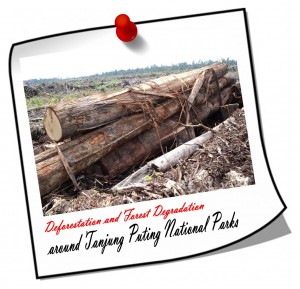 The march of forest destruction in Indonesia forges on, threatening the rainforest ecosystem and its biodiversity. The World Bank’s “Deforestation in Indonesia: A Review of the Situation in 1999″ estimated Indonesia’s forest coverage in the early 1900s at 35,700,000 Ha, of which Kalimantan had the lion’s share at 17,500,000 Ha. In 1985 the figure for Kalimantan was 11,11,900 Ha. The condition was further exacerbated by massive deforestation between 1985 à 1997 when Kalimantan was estimated to have lost around 58% of its forest cover. In other words, par 1997 there was a mere 4,707,800 Ha of forest cover.
The march of forest destruction in Indonesia forges on, threatening the rainforest ecosystem and its biodiversity. The World Bank’s “Deforestation in Indonesia: A Review of the Situation in 1999″ estimated Indonesia’s forest coverage in the early 1900s at 35,700,000 Ha, of which Kalimantan had the lion’s share at 17,500,000 Ha. In 1985 the figure for Kalimantan was 11,11,900 Ha. The condition was further exacerbated by massive deforestation between 1985 à 1997 when Kalimantan was estimated to have lost around 58% of its forest cover. In other words, par 1997 there was a mere 4,707,800 Ha of forest cover.
Habitat degradation and deforestation not only threaten plant species but also wildlife such as orangutans which act as an umbrella apex species for other wildlife as well as the sustainability of communities living in, and on the edges of the forest. FNPF is fully aware that sustainable conservation programs will not succeed without the right approach and involvement of all stakeholders. The protection of wildlife such as orangutans will be futile without the protection of their habitat, which is under constant threat of destruction, and the provision of an alternative management solution for a viable lifestyle for communities living in and on the edges of the forest.
WILDLIFE
Orangutan - Habitat Lost
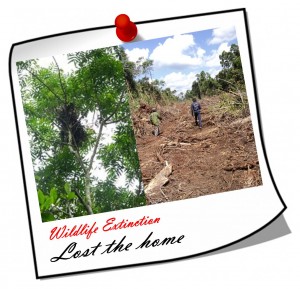 The continuing existence of wild orangutans is increasingly hard to see in the face of rapid forest destruction. Increasing development of large-scale, commercial forest industries like logging since the 1970s and massive palm oil plantation expansion since the start of the year 2000 are the cause of the continuing decrease of forest area in Tanjung Puting National Park. Not only have they lost trees to build nests, the loss of food sources are forcing the orangutans to enter palm oil plantations to look for food. The disappearance of the forests is often the cause for conflict between animals and humans. Orangutans are seen as pests because they enter the plantations and eat the palm oil fruit. As a result, the hunting and killing of orangutans is rampant, while extremely hard to prove as these activities are illegal. Orangutans are an endangered species under IUCN red list and protected under CITES APPENDIX I.The number of wild orangutans outside Tanjung Puting National Park continues to decline. In the forest of Tanjung Harapan village around Tanjung Puting National Park sightings of orangutan populations are increasingly rare. This is evidenced by the small numbers of nests and the lost of forest area due to land conversion and palm oil plantation expansion. In 2005-2006 FNPF staff were able to see at least 15 orangutans on a single patrol, currently only 1 ou 2 wild orangutans are sighted in Jerumbun area, upriver from Tanjung Harapan village where the FNPF agro-forestry programs located.
The continuing existence of wild orangutans is increasingly hard to see in the face of rapid forest destruction. Increasing development of large-scale, commercial forest industries like logging since the 1970s and massive palm oil plantation expansion since the start of the year 2000 are the cause of the continuing decrease of forest area in Tanjung Puting National Park. Not only have they lost trees to build nests, the loss of food sources are forcing the orangutans to enter palm oil plantations to look for food. The disappearance of the forests is often the cause for conflict between animals and humans. Orangutans are seen as pests because they enter the plantations and eat the palm oil fruit. As a result, the hunting and killing of orangutans is rampant, while extremely hard to prove as these activities are illegal. Orangutans are an endangered species under IUCN red list and protected under CITES APPENDIX I.The number of wild orangutans outside Tanjung Puting National Park continues to decline. In the forest of Tanjung Harapan village around Tanjung Puting National Park sightings of orangutan populations are increasingly rare. This is evidenced by the small numbers of nests and the lost of forest area due to land conversion and palm oil plantation expansion. In 2005-2006 FNPF staff were able to see at least 15 orangutans on a single patrol, currently only 1 ou 2 wild orangutans are sighted in Jerumbun area, upriver from Tanjung Harapan village where the FNPF agro-forestry programs located.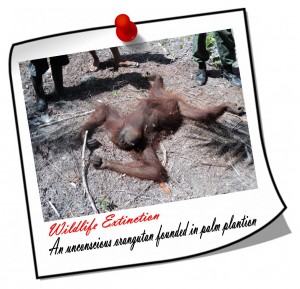
The ambigious and unfinished Land Use Planning for Central Kalimantan leads to overlaps and potential conflicts as well as loopholes for rampant expansion of palm oil plantations. These have been in existence in the area around Tanjung Harapan village since 1996. However, massive expansion occured since early 2000 and satelite images in 2010 shows at least 2,200 Ha of forest and administrative land owned by Tanjung Harapan village has been (illegally) turned into palm oil plantation. With the continuing destruction of the forests around the area of Tanjung Puting National Park, the threat to the orangutans and the rainforest ecosystem remains unchecked.
HABITAT
The rainforests of Kalimantan are host to highly varied biodiversity due to their unique topographical conditions. Peat swamp forests are not only life-giving to their resident flora and fauna but also act as suppliers of environmental services such as water supply, carbon absorption and storage, as well as barriers against sea water intrusion into rivers. Tanjun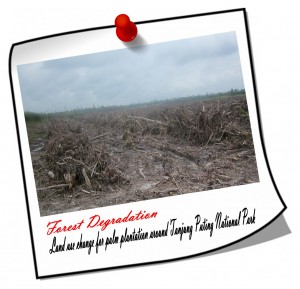 g Puting National Park with an area of 415,040 Ha (SK Penetapan 687/ Kpts-II/ 1996, 25 Oktober 1996) dan Lamandau River Wildlife Reserve at ± 56.584 Ha (Surat keputusan 47/LAP/BPKH Bjb-1/2005 dan 48/LAP/BPKH Bjb-1/2005 berdasarkan hasil Penataan Batas Definitif oleh BPKH Wilayah V Banjarbaru pada tahun 2005) are low-land protected forests dominated by peat swamps and are vitally important habitat for the endangered orangutans and other wildlife living in the rainforests. Unfortunately, rampant and unchecked forest degradation and destruction continue to threaten their ecosystem. Evidence of this is the growing mass of critically damaged land in the protected forests area. There are no reliable and correct data documenting the total size of forest destruction and critical land in the above mentioned two protected areas, however visitors will be able to witness the extend of the damage in the forests of Kalimantan including Tanjung Puting, Lamandau River Wildlife Reserve and their surrounding areas. Here is a link to give you first hand information on the real cause for the growing size of critically damaged land around Tanjung Puting National Park.
g Puting National Park with an area of 415,040 Ha (SK Penetapan 687/ Kpts-II/ 1996, 25 Oktober 1996) dan Lamandau River Wildlife Reserve at ± 56.584 Ha (Surat keputusan 47/LAP/BPKH Bjb-1/2005 dan 48/LAP/BPKH Bjb-1/2005 berdasarkan hasil Penataan Batas Definitif oleh BPKH Wilayah V Banjarbaru pada tahun 2005) are low-land protected forests dominated by peat swamps and are vitally important habitat for the endangered orangutans and other wildlife living in the rainforests. Unfortunately, rampant and unchecked forest degradation and destruction continue to threaten their ecosystem. Evidence of this is the growing mass of critically damaged land in the protected forests area. There are no reliable and correct data documenting the total size of forest destruction and critical land in the above mentioned two protected areas, however visitors will be able to witness the extend of the damage in the forests of Kalimantan including Tanjung Puting, Lamandau River Wildlife Reserve and their surrounding areas. Here is a link to give you first hand information on the real cause for the growing size of critically damaged land around Tanjung Puting National Park.
Orangutans and other wildlife in the rainforests need their habitat to survive. An important part of FNPF’s work to protect them and the rainforests ecosystem is reforestation in Tanjung Puting National Park, Lamandau River Wildlife Reserve and the surrounding areas. FNPF applies a unique, holistic approach to implement the program which sets it apart from similar activities. Read on to find out how we do it…
Not Just Planting…..
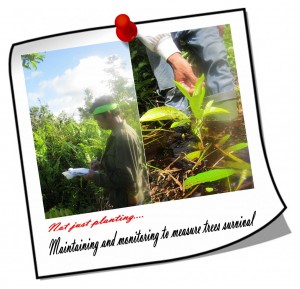 Many replanting and reforestation programs are confined to planting and ceremonial activities only. Trees, however, are not so different from humans in that they require nurturing and acclimatisation to survive. FNPF reforestation program not only plants but, more importantly, nurtures and monitors the saplings prior to the actual planting. This is followed by a 3-year monitoring period to track their progress and adaptability to the location. Moreover the trees are endemic species suited to the topography of the reforestation areas, and have been tried and tested for high survival rates.
Many replanting and reforestation programs are confined to planting and ceremonial activities only. Trees, however, are not so different from humans in that they require nurturing and acclimatisation to survive. FNPF reforestation program not only plants but, more importantly, nurtures and monitors the saplings prior to the actual planting. This is followed by a 3-year monitoring period to track their progress and adaptability to the location. Moreover the trees are endemic species suited to the topography of the reforestation areas, and have been tried and tested for high survival rates.
Depuis 2003 FNPF has planted around 151,527 trees or a space of 291 Ha in the following areas in Tanjung Puting: Pesalat, Beguruh and Padang Sembilan which are the critical areas damaged by logging, gardening and forest fires in and around Tanjung Puting National Park. These locations are made up of varying terrains such as dry land and swamps. These types of location each possess unique characteristics, requiring the correct strategies and additional efforts and resources to suit the complex nature of land. These are not just areas deeply flooded during the rainy spells and bushy fire hazards in the dry seasons.
In the first quarter 2012 FNPF has planted about 16,000 trees on 40 Ha in Beguruh-Padang Sembilan and 1,440 trees in Pesalat. Monitoring is done to determine the need for replanting. This way we are able to ensure and measure the survival rate of the trees. At the least there are 48,000 trees or a space of 120 Ha to be monitored alternately in a 6-month period. Monitoring is also crucial as a means of patrolling the area against the threat of forest destruction, fires, hunting and logging.
Our quest to protect the orangutans and other wildlife by restoring their habitat through reforestation can not happen and continue properly without your support. We extend our greatest gratitude to the various parties funding our reforestation program in Tanjung Puting National Park: L' BOEING Corporation, TCSA, B1G1, HSI Australia, et, bien sûr, to all our volunteers and supporters through memberships and individual donations.
People and Trees
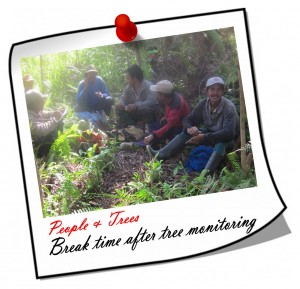 Environment conservation endeavours without the participation of local communities surrounding the conversation areas are impossible to do. FNPF not only trusts but always tries to implement active participation of the village communities in any conservation activities. Since 1997 we have lived and worked with the population of Tanjung Harapan village in an effort to protect the Tanjung Puting National Park area from various threats to the preservation of the national park and the surrounding ecosystem.
Environment conservation endeavours without the participation of local communities surrounding the conversation areas are impossible to do. FNPF not only trusts but always tries to implement active participation of the village communities in any conservation activities. Since 1997 we have lived and worked with the population of Tanjung Harapan village in an effort to protect the Tanjung Puting National Park area from various threats to the preservation of the national park and the surrounding ecosystem.
FNPF’s reforestation programme is not only handled by our own staff but at the same time enjoys the active participation of the inhabitants of Tanjung Harapan village who are part of the Tegari Lestari Group, established under the guidance of FNPF. The Tegari Lestari Group is fully involved in land preparation, seed gathering, sapling supply, planting as well as maintainance and monitoring. This year the group has been fully active in the implementation of our planting programme in Beguruh-Padang Sembilan, in a 40 Ha area, funded by BOEING.
Currently members of the group are not only involved in the FNPF reforestation programme but have, independently, managed to act as suppliers of seedlings to the planting programme, other organisations and companies.
New Home in the Critical Area
Because of the success of FNPF reforestation method in Tanjung Puting National Park, the Central Kalimantan Bureau of Natural Resource Conservation (BKSDA) has invited FNPF to run a reforestation project in the Lamandau River Wildlife Reserve. In 2009, FNPF staff conducted a survey on the terrain in the protected forest area to determine the locations where reforestation is needed. What they found was more open land and critical areas on the west side of the Lamandau River Wildlife Reserve. Based on the survey it was decided to base the new reforestation project in Kajang, near the village of Sungai Pasir in the Sukamara recency.
The Lamandau River Wildlife Reserve (LRWR) is a location for captive orangutans based on the Decree of the Minister of Forestry Number: 162/Kpts-II/1988 dated 26 Février 1998, regarding the alteration of the function of permanent production forest and areas of production forest that can be converted in the Lamandau River group of forests (+/- 76,110 Ha according to Central Kalimantan BKSDA). There are at least 500 captive orangutans released in this location. Forest fires, whether on purpose or otherwise, and illegal hunting activities are a huge threat annually, particularly in the dry season. Beside planting, we believe it is of utmost importance to engage the communities around the area to protect the location.
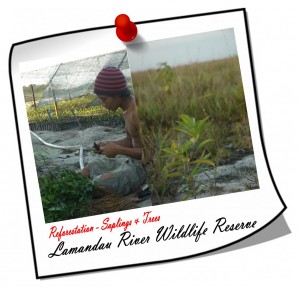 FNPF commenced the LRWR reforestation program in 2010, starting with experimental planting to test survival rates; making grass cuttings for support and as a filter in the planting hole; and grafting as a means of reproducing. Reforestation activities not only cover planting but also seed selection/testing to match the condition of the planting areas. The location is very open, dominated by weeds which easily burn in the dry season and flood during the wet months; the soil is very sandy and nutrient-poor.
FNPF commenced the LRWR reforestation program in 2010, starting with experimental planting to test survival rates; making grass cuttings for support and as a filter in the planting hole; and grafting as a means of reproducing. Reforestation activities not only cover planting but also seed selection/testing to match the condition of the planting areas. The location is very open, dominated by weeds which easily burn in the dry season and flood during the wet months; the soil is very sandy and nutrient-poor.
At the initial planting, dans 2011, FNPF planted an area of 8 Ha to create a corridor. By early 2012 we had at least 141,250 seedlings in our nursery and planted 29,250 trees. Cultivated and planted tree species are among others ubar samak (Syzygium sp.), belangeran (Shorea belangerans), ubar putih (Syzygium sp.) and pelawan (Tristania obovata). Part of the cultivation and planting activities are done with the help of Sungai Pasir villagers. Our efforts to protect the location through planting and fire patrol are supported by various parties such as Said, TCSA, HSI Australia and BKSDA SKW II Central Kalimantan.
FNPF hopes that each of our endeavours in protecting the endangered orangutans and other wildlife through reforestation around both Tanjung Puting National Park and Lamandau River Wildlife Reserve will increase their chances of survival and provide new habitat for them. However, all our efforts will mean nothing without all the support we have been given by a host of parties. Every single one of you, whether individuals or organisations can contribute to the protection of the endangered orangutans and other wildlife, as well as the conservation of the rainforest ecosystem by supporting us through:
- Sponsoring a Hectare of Orangutan Habitat
- FNPF membership
- Donate working equipment: GPS, cameras, extincteurs, rainwear, bags, mattresses, tentes, hamacs, field footwear
- Donate equipment for planting activities: paranet, polybags, greffoirs, garden shears, hoes, working gloves
For further information on FNPF programmes in Borneo and how to donate, please email info.borneo@fnpf.org
COMMUNITY
Pendidikan Konservasi untuk Desaku / Conservation Education for My Village
The forest is not only a mine of natural resources such as wood but, at the same time, plays an important role as supplier to the environment for clean water, natural medicine, protein and clean air. Sadly, awareness of the important role the forests play as a balancing agent for the ecosystem remains woefully low as evidenced by the still rampant and massive forest destruction. Opinions abound blaming communities living on forest edges as the cause of the damage to the world’s forests. In reality it is these marginalised communities who are often the real victims of forests degradation.
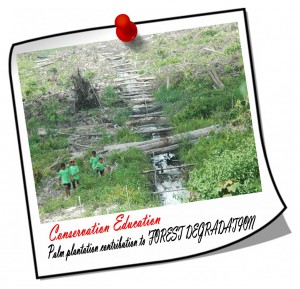 This is what has happened to the communities of Tanjung Harapan village, which is directly adjascent to Tanjung Puting National Park. Years of forest degradation resulted in a disturbed surrounding ecosystem, and the villagers are suffering from water crisis, poor health and the threat of loss of livelihood. It is therefore crucial to engage the communities on the edges of the forests to act not only as primary guardians of the forests but also to enable them to gain benefits from conservation programs in the area.
This is what has happened to the communities of Tanjung Harapan village, which is directly adjascent to Tanjung Puting National Park. Years of forest degradation resulted in a disturbed surrounding ecosystem, and the villagers are suffering from water crisis, poor health and the threat of loss of livelihood. It is therefore crucial to engage the communities on the edges of the forests to act not only as primary guardians of the forests but also to enable them to gain benefits from conservation programs in the area.
Children are the next generation to become community leaders. Education on, and awareness building for, environmental issues are high on FNPF’s list. Our conservation education started in 2004 involving students and children in Tanjung Harapan village. They are encouraged to actively take part in field trips aimed at introducing and gaining understanding of conditions surrounding the village.
In the first half of 2012, FNPF has conducted at least 7 conservation education activities, through field trips to Jerumbun (where our agroforestry demonstration plot is located) and visiting palm oil plantations. An average of 41 youngsters took part in each trip, where they observed their village forest condition (severely cut down by palm oil plantations) and learnt to make compost; grew seedlings in the nursery and learnt about the various medicinal plants. In June, the children of Tanjung Harapan village were visited by students from SDN 3 Hilir (state elementary school) et, together, they had a session on conservation education.
To complement our conservation education programme, FNPF also provides other additional support, aimed at enhancing skills and knowledge, by setting-up a “reading house”. Earlier in 2012 FNPF provided the facility as a learning centre for the children of Tanjung Harapan village and they manage the running of it themselves. The reading house is a place where the children of Tanjung Harapan village come to do various learning activities, visiting the library, running workshops and classes as well as discussions.
Both the children of Tanjung Harapan village and the reading house are still in need of assistance in terms of learning media and reading materials. Any help you can give means a great deal to them for whom access to electricity and information remains a major issue. Some ideas for things you can donate:
- Recreational and educational books for children (new or pre-used)
- CDs or movies on conservation education
- Camera, LCD or pre-used laptops in good working order
- Lights or solar electricity
- Writing, painting or drawing materials
- Play or learning tools
For further details please write us at info.borneo@fnpf.org
Alternative Income
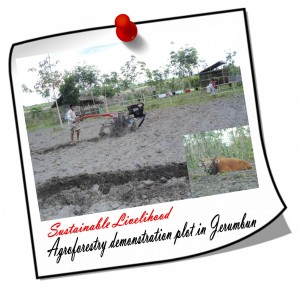 For communities living on the edges of forests, those areas are their primary source of livelihood and economic needs. Policies stipulating areas for protected forests and exploitation of forests resources are the lead factor threatening the sustainability of these communities. Conservation programmes or large-scale forest management too often do not bring benefits and welfare to these people. Indeed, frequently they are positioned as marginalised groups, the victims and spectators on their own land.
For communities living on the edges of forests, those areas are their primary source of livelihood and economic needs. Policies stipulating areas for protected forests and exploitation of forests resources are the lead factor threatening the sustainability of these communities. Conservation programmes or large-scale forest management too often do not bring benefits and welfare to these people. Indeed, frequently they are positioned as marginalised groups, the victims and spectators on their own land.
FNPF continuously adopts a holistic approach, believing that communities are key to the success or failure of a programme. In Tanjung Harapan village we encourage the villagers to engage in activities that can bring them alternative income and to take active participation in conservation drives to protect Tanjung Puting National Park and the surrounding areas. In response, the village has formed a number of community groups doing various businesses as alternative sources of income. Among these are the ecotourism group “Sekonyer Bahari” and the agroforestry group “Sekonyer Lestari”.
Since the start of 2012, Sekonyer Bahari has taken a number of groups for trekking and the agroforestry group has sold around 7,500 trees to ASTRA, earning around IDR 26,250,000. The trees are of the following species: papung (Sandoricum beccarianum), damar (Agathis borneensis), gaharu (Aquilaria malaccensis) and nyatoh (Payena leerii). Moreover, FNPF has developed an integrated farming model or agroforestry and set up a demonstration plot in Jerumbun. Our hope is to have the villagers adopt the activities and thereby acquire alternative income from growing short-term plants (horticulture); long-term plants i.e. trees with high economic value which require no cutting down (rubber and gaharu); as well as farming (chickens and cows). January to June, the focus of FNPF staff was on making compost, planting elephant grass and a living apothecary in the agroforestry demo plot in Jerumbun. Some members of the community have now adopted our activity by planting their plots with gaharu trees.
FNPF efforts to activate the communities of Tanjung Harapan village in alternative income sourcing does not provide instant and substantial gain. However, those acitivities are paving the way to finding sustainable income streams while supporting endeavours to conserve and protect the area of Tanjung Puting National Park. Massive expansion of palm oil plantations and gold mining activities are huge threats not only to FNPF work but are also threatening the preservation of the ecosystem in Tanjung Puting National Park and the surrounding areas. Palm oil and mining offer quick and easy money for the villagers. The lack of means for improving their wellbeing; minimal access to electricity, transportation and health facilities provide fast and easy avenues for those sectors to move in.
Rampant expansion of mining and palm oil plantations are harmful to the forests and a real threat to their biodiversity, causing loss of clean water and air, as well as hugely exarcebating global climate change. There are 2,200 Ha forest and administrative area owned by Tanjung Harapan village which has turned into a palm oil plantation and the threat to the ecosystem in the area of Tanjung Puting National Park is and will continue happening. Forest destruction will not stop so long as government policies do not guarantee the protection of community rights and do not support environment conservation efforts. What will happen next?
Lend your support to stop the rampant expansion of palm oil plantations by voting in:
http://act.ran.org/p/dia/action/public/?action_KEY=4632&track=website
In closing, FNPF wishes to thank all our donors, supporters and volunteers for their generous contributions without which none of our work would be possible….







